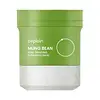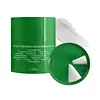What's inside
What's inside
 Key Ingredients
Key Ingredients

 Benefits
Benefits

 Concerns
Concerns

 Ingredients Side-by-side
Ingredients Side-by-side

Cetyl Ethylhexanoate
EmollientEthylhexyl Palmitate
EmollientSynthetic Wax
AbrasivePEG-20 Glyceryl Triisostearate
EmollientSorbeth-30 Tetraoleate
EmulsifyingGlycine Soja Oil
EmollientSorbitan Sesquioleate
EmulsifyingCaprylic/Capric Triglyceride
MaskingPEG-8 Diisostearate
EmulsifyingSilica Dimethyl Silylate
EmollientEthylene/Propylene Copolymer
AbrasiveVigna Radiata Seed Extract
Skin ConditioningCamellia Sinensis Seed Oil
HumectantCamellia Sinensis Leaf Powder
ExfoliatingHouttuynia Cordata Powder
Skin ConditioningMelia Azadirachta Leaf Extract
Skin ConditioningPhaseolus Radiatus Seed Powder
Melia Azadirachta Flower Extract
Skin ConditioningWater
Skin ConditioningCoccinia Indica Fruit Extract
Skin ConditioningButylene Glycol
HumectantSolanum Melongena Fruit Extract
Skin ConditioningAmber Powder
Gluconolactone
Skin ConditioningCeramide NP
Skin ConditioningCapryloyl Salicylic Acid
ExfoliatingCurcuma Longa Root Extract
MaskingOcimum Sanctum Leaf Extract
Skin ConditioningCorallina Officinalis Extract
Skin ConditioningMoringa Oleifera Seed Oil
Emollient1,2-Hexanediol
Skin ConditioningLactobacillus/Soymilk Ferment Filtrate
Skin ConditioningCetyl Ethylhexanoate, Ethylhexyl Palmitate, Synthetic Wax, PEG-20 Glyceryl Triisostearate, Sorbeth-30 Tetraoleate, Glycine Soja Oil, Sorbitan Sesquioleate, Caprylic/Capric Triglyceride, PEG-8 Diisostearate, Silica Dimethyl Silylate, Ethylene/Propylene Copolymer, Vigna Radiata Seed Extract, Camellia Sinensis Seed Oil, Camellia Sinensis Leaf Powder, Houttuynia Cordata Powder, Melia Azadirachta Leaf Extract, Phaseolus Radiatus Seed Powder, Melia Azadirachta Flower Extract, Water, Coccinia Indica Fruit Extract, Butylene Glycol, Solanum Melongena Fruit Extract, Amber Powder, Gluconolactone, Ceramide NP, Capryloyl Salicylic Acid, Curcuma Longa Root Extract, Ocimum Sanctum Leaf Extract, Corallina Officinalis Extract, Moringa Oleifera Seed Oil, 1,2-Hexanediol, Lactobacillus/Soymilk Ferment Filtrate
 Reviews
Reviews

Ingredients Explained
These ingredients are found in both products.
Ingredients higher up in an ingredient list are typically present in a larger amount.
Camellia Sinensis Seed Oil is the oil expressed from the seeds from the tea plant. This is the same plant we get green, black, and oolong tea from.
Camellia Sinensis Seed Oil is rich in oleic acid. This makes it an effective moisturizer. By drawing moisture to the skin, Camellia Oleifera Seed Oil helps keep your skin hydrated.
Other components of Camellia Sinensis Seed Oil includes Vitamin E and polyphenols. These are antioxidants that may help slow down the signs of aging. Antioxidants help fight free-radicals, or unstable molecules that can damage our skin cells.
Camellia Sinensis Seed Oil also has anti-inflammatory properties.
The seed oil comes from the dried kernels of the plant.
Learn more about Camellia Sinensis Seed OilThis ingredient is an emollient, solvent, and texture enhancer. It is considered a skin-softener by helping the skin prevent moisture loss.
It helps thicken a product's formula and makes it easier to spread by dissolving clumping compounds.
Caprylic Triglyceride is made by combining glycerin with coconut oil, forming a clear liquid.
While there is an assumption Caprylic Triglyceride can clog pores due to it being derived from coconut oil, there is no research supporting this.
Learn more about Caprylic/Capric TriglycerideCetyl Ethylhexanoate is an emollient ester. It comes from cetearyl alcohol and 2-ethylhexanoic acid.
Cetyl Ethylhexanoate is an emollient that adds a velvety feel to skin without being greasy or oily. Emollients help trap moisture into your skin, keeping your skin soft and hydrated.
Peg-20 Glyceryl Triisostearate comes from Isostearic Acid and glycerin.
It is an emollient, emulsifier, and gentle cleanser. As an emollient, it helps trap moisture to keep skin soft and hydrated. Emulsifiers help prevent ingredients from separating.
This ingredient is common in oil-based products. This is because it helps oil-ingredients be easily washed away without leaving a residue.
Peg-20 Glyceryl Triisostearate may not be fungal-acne safe.
Learn more about PEG-20 Glyceryl TriisostearateSorbitan Sesquioleate is derived from sorbitol and oleic acid. It is an emulsifier and prevents ingredients from separating.
Specifically, this ingredient is a water-in-oil emulsifier, meaning it helps water dissolve into oil.
Some studies suggest this ingredient may cause irritation in some people. If you are unsure, it is best to patch test.
This ingredient may not be Malassezia folliculitis, or fungal-acne safe.
Learn more about Sorbitan SesquioleateSynthetic Wax is created from fossil fuels such as natural gas. It is used to enhance texture, adjust pH, and as an occlusive.
It may also be used as an abrasive ingredient to exfoliate the skin.
Synthetic Wax may not be fungal acne safe.
Learn more about Synthetic WaxWater. It's the most common cosmetic ingredient of all. You'll usually see it at the top of ingredient lists, meaning that it makes up the largest part of the product.
So why is it so popular? Water most often acts as a solvent - this means that it helps dissolve other ingredients into the formulation.
You'll also recognize water as that liquid we all need to stay alive. If you see this, drink a glass of water. Stay hydrated!
Learn more about Water